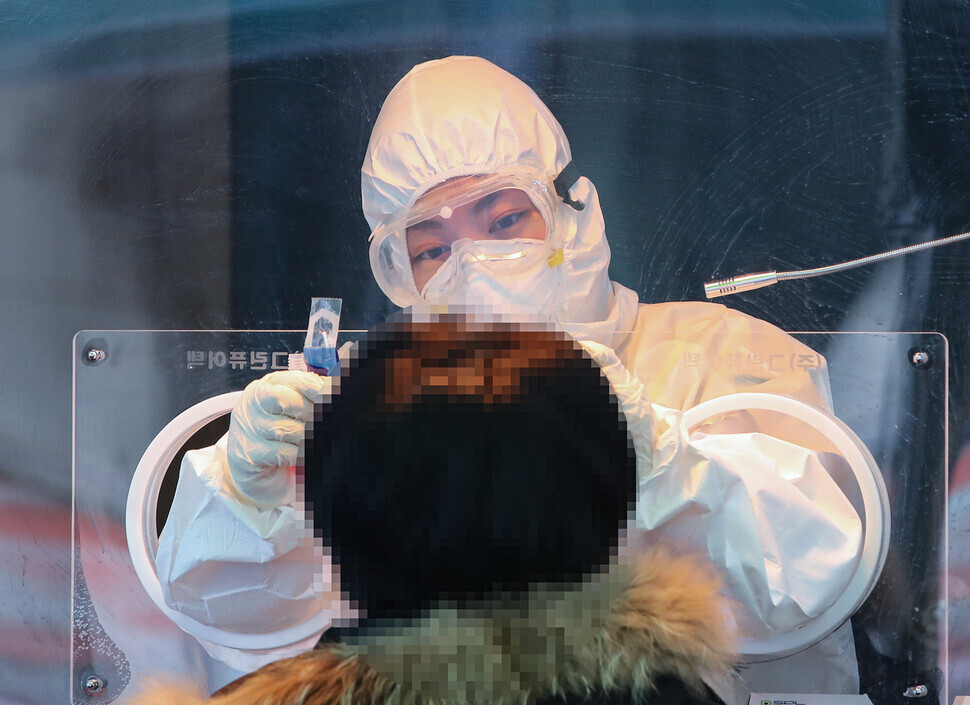hankyoreh
Links to other country sites 다른 나라 사이트 링크
COVID patients experience hair loss, shortness of breath, fatigue months after recovery, study shows

Former COVID-19 patients exhibit relatively high levels of symptoms such as hair loss and shortness of breath three months after recovery and fatigue six months after recovery, a study shows.
Diminished lung function and pulmonary fibrosis were observed in some patients, while others showed symptoms of depression and post-traumatic stress disorder (PTSD).
In a regular briefing on Jan. 14, Korea Disease Control and Prevention Agency (KDCA) Deputy Director Kwon Jun-wook shared a study of clinical aftereffects among COVID-19 patients, which included results from examinations and surveys conducted at three-month intervals on 40 adult patients by the Korea National Institute of Health (KNIH) and the National Medical Center (NMC).
“Some of the patients exhibited diminished lung function with a trend of recovery observed over time, and computerized tomography (CT) observation of the lungs showed a considerable amount of lingering lung inflammation even after three months. After six months, that had mostly improved, but some pulmonary fibrosis was present,” he explained. Pulmonary fibrosis is a condition in which lung tissue hardens.
Kwon said that the 40 patients “included an even mixture of patients with mild, moderate, and severe symptoms and an even distribution of age groups.”
“Diminished lung function was most prevalent among older patients aged 60 and over and those with severe symptoms,” he said.
“In the case of psychological aftereffects, depression tended to diminish over time, while PTSD tended to increase,” he added.
Kwon also discussed aftereffects observed overseas.
“In China, 76% of recovered patients complained of ongoing symptoms, the most common of which were muscle weakness and sleep disorders. In the US, there was an increase in the mortality rate among patients with underlying conditions,” he said.
Meanwhile, the South Korean government decided to administer the COVID-19 antibody treatment Regkirona (regdanvimab) developed by Celltrion to senior citizens and high-risk patients ahead of granting conditional Ministry of Food and Drug Safety (MFDS) approval.
Kwon explained, “The MFDS is currently considering granting approval for Phase 3 trials for the antibody treatment. Prior to granting conditional approval, the National Infectious Disease Research Institute is holding discussions with the MFDS on clinical trials. The administration of antibody treatments to senior citizens and high-risk patient patients will be carried out with the participation of 35 healthcare institutions and 75 researchers in all.”
Jang Hee-chang, director of the KNIH’s National Infectious Disease Research Institute, said, “In pre-clinical trials, Regkirona effectively suppressed the COVID-19 virus, with related findings co-published on Jan. 12 in the scientific journal Nature Communications.”
“These findings need to undergo additional testing through large-scale Phase 3 trials,” he explained.
Jang went on to say the institute had “evaluated the antibody treatment’s neutralizing capabilities against the virus strains prevalent in South Korea to date and confirmed that the neutralizing capabilities were retained.”
He added that there would be “additional assessment of neutralizing capabilities against the [variant] virus strains introduced from the UK and South Africa.”
By Suh Hye-mi, staff reporter
Please direct comments or questions to [english@hani.co.kr]

Editorial・opinion
![[Editorial] Intensifying US-China rivalry means Seoul must address uncertainty with Beijing sooner than later [Editorial] Intensifying US-China rivalry means Seoul must address uncertainty with Beijing sooner than later](https://flexible.img.hani.co.kr/flexible/normal/500/300/imgdb/original/2024/0517/8117159322045222.jpg) [Editorial] Intensifying US-China rivalry means Seoul must address uncertainty with Beijing sooner than later
[Editorial] Intensifying US-China rivalry means Seoul must address uncertainty with Beijing sooner than later![[Column] When ‘fairness’ means hate and violence [Column] When ‘fairness’ means hate and violence](https://flexible.img.hani.co.kr/flexible/normal/500/300/imgdb/original/2024/0516/7417158465908824.jpg) [Column] When ‘fairness’ means hate and violence
[Column] When ‘fairness’ means hate and violence- [Editorial] Yoon must stop abusing authority to shield himself from investigation
- [Column] US troop withdrawal from Korea could be the Acheson Line all over
- [Column] How to win back readers who’ve turned to YouTube for news
- [Column] Welcome to the president’s pity party
- [Editorial] Korea must respond firmly to Japan’s attempt to usurp Line
- [Editorial] Transfers of prosecutors investigating Korea’s first lady send chilling message
- [Column] Will Seoul’s ties with Moscow really recover on their own?
- [Column] Samsung’s ‘lost decade’ and Lee Jae-yong’s mismatched chopsticks
Most viewed articles
- 1[Editorial] Transfers of prosecutors investigating Korea’s first lady send chilling message
- 2[Exclusive] Unearthed memo suggests Gwangju Uprising missing may have been cremated
- 3S. Korea “monitoring developments” after report of secret Chinese police station in Seoul
- 4[Editorial] Intensifying US-China rivalry means Seoul must address uncertainty with Beijing sooner t
- 5[Column] US troop withdrawal from Korea could be the Acheson Line all over
- 6China, Russia put foot down on US moves in Asia, ratchet up solidarity with N. Korea
- 7Xi, Putin ‘oppose acts of military intimidation’ against N. Korea by US in joint statement
- 8[Editorial] South Korean women are mobilizing in unprecedented ways
- 9Korea’s first openly trans athlete hopes to prompt a discussion by competing as herself
- 10300 Korean scholars, legal professionals say Yoon is using prosecutors to clamp down on press